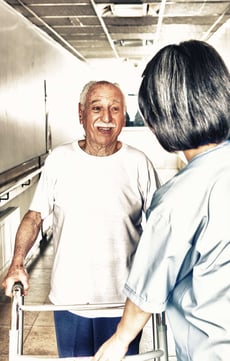 If you're in need of skilled nursing care, you'll certainly want to choose a facility for that care that is equipped to be effective in meeting your health and wellness needs. So what do you need to know to make sure that is so? Here are 7 critical components of effective skilled nursing care that you should expect to be present in any facility you choose to entrust with your care.
If you're in need of skilled nursing care, you'll certainly want to choose a facility for that care that is equipped to be effective in meeting your health and wellness needs. So what do you need to know to make sure that is so? Here are 7 critical components of effective skilled nursing care that you should expect to be present in any facility you choose to entrust with your care.
1. Highly-qualified, experienced, dedicated and professional staff
Nursing facilities that invest in exceptional staff, building highly-qualified, experienced and dedicated multidisciplinary care teams to provide comprehensive care to patients, are well-equipped to deliver effective skilled nursing care.
2. Solid staffing practices
The provision of effective care depends heavily on having adequate staffing levels at all times, ensuring that care professionals have ample time to attend to the individual needs of each patient in their charge thoroughly and efficiently.
3. Individualized, patient-centered treatment and care
Effective skilled nursing care uses a patient centered and personalized approach, honoring the individuality, preferences, opinions and input of patients and/or families or other representatives, encouraging them to be active, engaged and confident members of their own care team.
4. An emphasis on effective communication and efficient coordination of care
Effective care is organized, well-managed and well-coordinated, with regular communication among members of the care team, as well as regular meetings to share information, compare notes and assess the efficiency and efficacy of treatments, therapies and other components of treatment plans.
5. A holistic approach to health and wellness
Effective care means treating the whole person, rather than just a disease or condition, supporting health, well-being, independence and quality of life.
6. A culture of respect and compassion
This component of effective nursing care supports physical and emotional well-being by ensuring respect for patient's rights, dignity and privacy in all interactions, and fostering mutual respect in patient-staff relationships.
7. Adequate and up-to-date equipment and facilities
Providing effective care requires investment in modern, efficient tools of the trade – keeping up with new developments in terms of facilities, technology, techniques and equipment.
Each of the components listed above are critical to effective skilled nursing care. Together, they create an environment geared towards the provision high-quality care, services and support for patients, promoting optimal health outcomes, encouraging patient engagement and ensuring that patients and their family members or advocates feel valued, heard and respected throughout their care experience.





